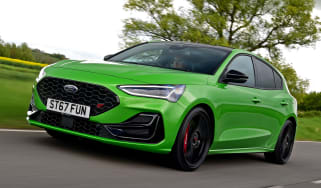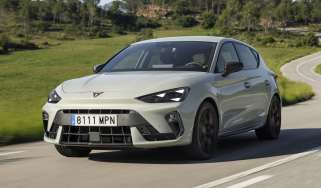Skoda Octavia vRS Estate (2013-2020) - Engines, drive & performance
Whichever engine you choose, the Skoda Octavia vRS Estate is fast and powerful
As part of the 2017 facelift, the petrol vRS was given an XDS+ electronic limited-slip differential, which allows you to apply full power earlier as you drive out of a corner – something that powerful front-wheel-drive cars like this often struggle with.
Enhanced driver enjoyment is the aim of the vRS button, too. Pressing it changes the exhaust note and sharpens the throttle response, while also adding weight to the steering for more feel. Unfortunately, none of the driving mode settings deliver quite as much feedback as you’d hope. If you're looking for more thrills, the we recommend the £850 optional Dynamic Chassis Control system (DCC). This allows you to firm up the suspension for when you want a sporty drive and loosen it off when you don't.
Meanwhile, the Octavia’s DSG gearbox can be hesitant and jerky when you’re driving around town, so keen drivers will likely prefer the precise six-speed manual.
Overall, the Skoda is a fast and competent performer, but it’s not as much fun to drive as the Ford Focus ST Estate. There’s grip and composure aplenty, yet it’s not hugely involving, and leans a little more in hard corners than the Golf GTI it shares parts with. It partially makes up for these shortcomings, though, by offering an impressively comfortable ride, which makes the vRS a superb motorway cruiser.
Skoda Octavia vRS Estate petrol & diesel engines
While the Estate’s added weight means it can’t quite match the Octavia vRS hatchback’s straight-line speed, it’s not far off. The Octavia vRS Estate petrol engine is the same 2.0-litre turbocharged unit as found under the bonnet of the Volkswagen Golf GTI and produces 242bhp – enough for 0-62mph in 6.7 seconds whether you choose the manual or automatic gearbox. Top speed is 153mph. It doesn’t feel like it has to be worked hard to make fast progress, either – with plenty of pulling power to accelerate at any speed.
The diesel offers 181bhp and can sprint from 0-62mph sprint in around eight seconds, while top speed is 143mph. The four-wheel-drive diesel version’s extra grip means a quicker 0-62mph time of 7.7 seconds.
A Challenge version sits at the top of the facelifted model line-up, but is barely any quicker than the standard petrol engine.










